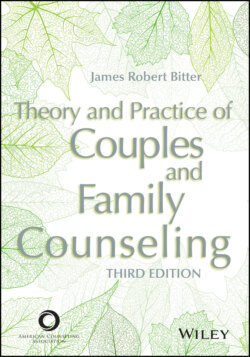Читать книгу Theory and Practice of Couples and Family Counseling - James Robert Bitter - Страница 108
Professional Regulations and Legal Requirements
ОглавлениеAlthough we tend to associate professional regulations with the professional boards of each state, in fact many groups get involved in the process of safeguarding both the public and the profession. Among these groups are voluntary professional organizations, state regulatory agencies, federal regulatory agencies, the judicial system, third-party payers (i.e., insurance companies and managed care companies), national regulatory associations, and sometimes international regulatory entities. Again, each of these groups has a recursive influence on the others: We often find, for example, that there is very little difference between the legal requirements for the practice of couples and family counseling and the certification requirements of various professional organizations. Indeed, it is not uncommon for licensure requirements to include specific professional certifications as a first step toward licensure.
All of the professional regulation agencies attempt to address three questions related to family practice: What is family counseling or therapy? How is competence as a family practitioner assessed and measured? How valid and relevant are those competency measures for protecting consumers?
Stukie and Bergen (2001) suggested 10 principles that should be considered in the development of professional regulations in the field. Among their recommendations are a comprehensive model based on effective professional development and growth rather than minimal competence; fully funded, staffed, and empowered regulatory boards; integrated regulatory boards that address all aspects of psychotherapy rather than separate disciplines; ongoing competency assessments that are demonstrable in spite of the costs and logistical problems that may be involved; standards of practice that detail requirements related to advertising, record keeping, informed consent, and other legal expectations for practitioners; disciplinary procedures that are immediately responsive to the needs of clients and practitioners; and the right of consumers to choose the mental health providers of their choice.
The field of psychotherapy in general, and couples and family therapy in particular, is no longer dominated by psychiatrists and doctoral-level psychologists. By far, most couples and family practitioners were trained at the master’s level and completed approximately 2 years of supervised practice before being evaluated and obtaining a license. This dramatic change has taken place in just the past 30–40 years. The number of people seeking psychotherapeutic services is also on the rise. To protect consumers and define professional identities and competence, professional regulations and state laws will become increasingly specific in their definitions and requirements for practice. Although it is impossible to legislate virtue, morality, good judgment, or clinical skills, state laws and professional regulations forge a professional covenant with the public. These regulations are always based on the application of principle ethics—and the principles always reflect the dominant community standards of the state or organization enacting them.
Indeed, state and national laws often take certain moral, ethical, and professional issues out of the hands of the practitioner. Helping professionals in most states, for example, are mandated to break confidentiality and take affirmative, prescribed actions if (a) clients are dangerous to themselves, to others, and in some states, to property; (b) clients engage in or suffer child or elder abuse; or (c) the helping professional is otherwise required to do so by courts in the administration and application of specific laws. Such mandates are considered in law to be so serious that the covenant with consumers requires a consistent outcome every time (i.e., reporting)—even if the outcome can be demonstrated to create more problems than it solves.
State and federal legal requirements have also created standards of care for psychotherapeutic practice. This is especially true for those professions and professionals who must operate under HIPAA requirements and standards. Failure to meet professional standards of practice is the most common grounds for malpractice and incurred liability. It is what makes professional liability insurance a necessity these days and increasingly expensive to purchase.
